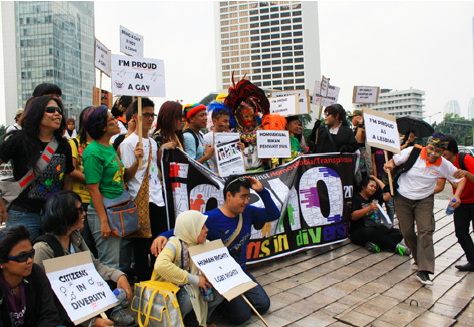In all, 20 of Brazil’s 27 provinces held IDAHO activities in 2012. These activities included marches against homo/transphobia, rallies, seminars, public hearings at local parliaments, film screenings, and advocacy pushing for local non-discrimination legislation.
Brazilian activists also joined the international 2012 IDAHO mobilization against homophobic and transphobic bullying in schools, which was largely focused on having reinstating the “Schools Without Homophobia” program that was shelved by President Dilma Rousseff last year.
In keeping with the education theme, activists in Florianopolis promoted their fourth poster contest focusing on homophobia, lesbophobia and transphobia in schools, using art to address discrimination based on sexual orientation and gender identity in educational institutions. They also conducted training for 30 teachers and school managers on such issues as gender, sexualities and homo/lesbo/transphobia in school life. The training was aimed at giving participants the theoretical tools with which to incorporate gender, sexuality and homo/lesbo/transphobia-related issues into their pedagogical practices.
A photographic exhibition toured Rio de Janeiro throughout May in commemoration IDAHO, taking the messages of 22 mothers of LGBT children to four different regions of the city. The exhibition showed 22 pictures of mothers accompanied by testimonies on the difficulties and joys of having LGBT children.
The “Multiple Sexualities Festival” organized by the Federal University of the State of Bahia included such events as a “Hot Night Out of The Closet” party, plays performed in public open spaces in seven cities of Bahia, the introduction of LGBTI jargon and popular expressions into academic spaces, and an artistic installation inside toilets. Also in Bahia, activists held a discussion on lesbian maternity, and in Salvador and in Dias D’ávila, a stand was set up in the center of town at which information material was distributed on IDAHO, on deconstructing homophobia and on HIV/AIDS and STI prevention.
In Brasilia, activists organized a picnic in the city’s main park and launched a short theater course for LGBT people.
In Bacabal, a week of activities was held, including an open-microphone session in which people were encouraged to speak up against homophobia and transphobia.
In Campo Grande, activists met with managers of penal institutions to discuss security issues, and held a seminar on LGBT and youth.
In Recife, activists organized “Occupy 17″, in which many parts of the city were occupied by LGBT people who engaged in such artistic interventions as graffiti, breakdance demonstrations and hip-hop performances and who distributed leaflets under the slogan “Free love: In Recife it’s legal”.
Medical students from Rio Preto held the First Cocktail Against Homophobia, and many artists, politicians and institutions showed their support for IDAHO via social networks. The hash tags #HomofobiaÉCrime, #BrasilSemHomofobia and #homofobia stayed among the Brazilian trending topics on Twitter throughout May 17, and the no homophobia hash tag was in the top 10 topics.
[google-map-v3 shortcodeid=”TO_BE_GENERATED” width=”600″ height=”350″ zoom=”5″ maptype=”roadmap” mapalign=”center” directionhint=”false” language=”default” poweredby=”false” maptypecontrol=”true” pancontrol=”true” zoomcontrol=”true” scalecontrol=”true” streetviewcontrol=”true” scrollwheelcontrol=”false” draggable=”true” tiltfourtyfive=”false” enablegeolocationmarker=”false” enablemarkerclustering=”false” addmarkermashup=”false” addmarkermashupbubble=”false” addmarkerlist=”Brazil{}1-default.png{}Brazil” bubbleautopan=”true” distanceunits=”miles” showbike=”false” showtraffic=”false” showpanoramio=”false”]
© Copyright 2024 All Rights Reserved - Privacy Policy


